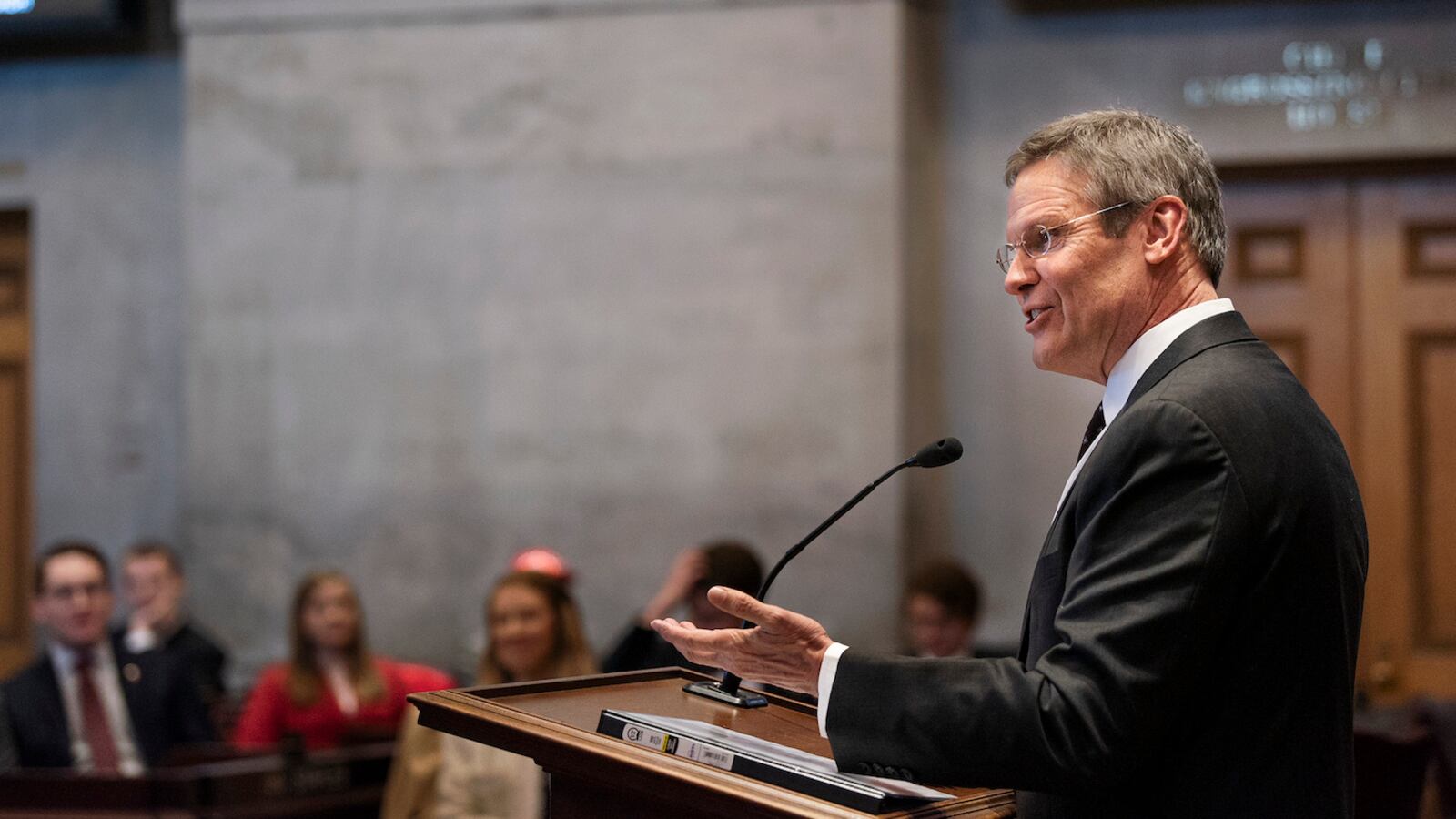When Bill Lee unveils his first spending plan on Monday as Tennessee’s new governor, he’ll include $70 million in new investments for K-12 education — and likely much more.
The Republican governor, who made education one of the pillars of his campaign, already has announced legislative initiatives that would beef up school security, career and technical education, and learning opportunities for science, technology, engineering, and math. He also plans to double a state fund to help charter schools pay for costly buildings and campuses, according to an early excerpt from Lee’s State of the State address, which he’ll deliver Monday evening to a joint session of the Tennessee General Assembly.
If the legislature approves, those initiatives would increase spending on public schools by more than 1 percent for the fiscal year beginning July 1.
Lee has said he also wants to allocate more money for teacher pay, which would continue the steady climb of compensation under the previous administration of Gov. Bill Haslam.
“We will certainly be supporting our teachers and our school leaders, and we’ll have specifics of that when we make the State of the State address,” Lee told reporters this week about his speech that will coincide with the budget’s release.
Lee’s spending plan will provide Tennesseans with their first detailed look at all of the first-year policies and priorities of the new governor, who offered few specifics on the campaign trail as he promised education improvements, better jobs, and safer neighborhoods.
His highly anticipated speech also should answer several questions that have dominated education policy conversations since his election in November: Will Lee push in his first year for more education choices for parents, as he pledged in his victory speech? And, if so, what would that look like?
“We’re going to be making that decision shortly, and we’ll be talking about it Monday,” Lee said when asked whether he’ll champion education savings accounts, a voucher program that has gained traction in recent years in states like Arizona, Florida, Mississippi, and Nevada.
Such accounts would let parents spend public money on private education services such as tuition, online courses, and tools for homeschooling. (Tennessee actually already offers education savings accounts for students with disabilities, although few families are enrolled in the program.)
The governor said that his address, which will begin at 6 p.m. Central Time in Nashville, will lay out the details of his plan. In the days that follow, he plans to hit the road to deliver regional addresses in Memphis and Knoxville.
“We’ll be talking about legislation that we’re proposing and most importantly the funding sources and the way we manage our budget to be fiscally conservative … but at the same time to invest in those things that matter,” said the former Williamson County businessman, who ran a $200 million home services company before his election.
During his last term in office, Haslam invested an extra $500 million toward teacher compensation. But the increase didn’t always reach educators’ paychecks. That’s because the state’s funding formula gives local districts discretion in how to use money for instructional needs if they already are paying their teachers the state’s base salary of $35,000.
Educator groups are anxious to see salary increases.
“We hope it’s a good year for compensation,” said JC Bowman, who leads the Professional Educators of Tennessee. “But we also want to make sure that any new dollars actually reach teachers. Districts have to submit their pay plans to the state, so the state does have some control over this.”
Others say they’ll be listening for what Lee might say about education equity, testing, teacher preparation, and more investments in literacy, pre-kindergarten, principals, and services to support students with mental health or behavioral challenges.
“I certainly hope that he’s able to make course offerings more equal across the state,” said Keith Williams, executive director of the Memphis-Shelby County Education Association.
Tikeila Rucker, who leads the United Education Association of Shelby County, said she’s anxious to hear Lee address school funding and also “parent choice” policies, especially since the legislature often turns to students in Memphis when piloting new education programs.
“I’m really eager to see what he has to say about vouchers,” Rucker said.
Another hot-button topic would be the state’s complex formula for funding schools known as the Basic Education Program, or BEP. Districts in Memphis and Nashville have sued the state over the adequacy of its funding through the BEP. The lawsuit is expected to go to trial this year, but the outcome likely will be appealed.
“I would love if he brought it up,” Bowman said. “I think we need to launch into BEP 3.0 and update our funding formula to reflect changing needs. We can’t wait for court rulings.”
Lee’s speech will be televised by news outlets and also live-streamed at www.capitol.tn.gov.
Editor’s note: This story has been updated with new details and to include Lee’s plan to double the state’s charter school facility fund.
Chalkbeat reporter Laura Faith Kebede contributed to this report.

